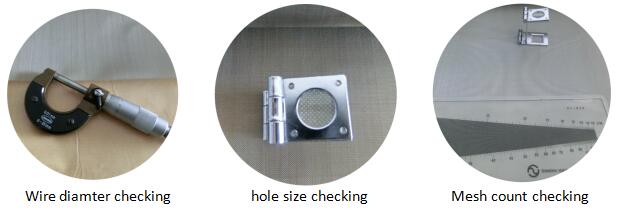When checking woven wire mesh, there are several major items that are typically inspected to ensure quality and adherence to specifications. Here are the key checking items for woven wire mesh:
Mesh Count: The mesh count refers to the number of wires or openings per linear inch in the woven wire mesh. It is checked by counting the number of wires or openings within a specified length and comparing it to the required mesh count. This is typically done using a calibrated measuring device.
Wire Diameter: The wire diameter is the thickness of the wires used in the woven wire mesh. It is measured using micrometers or wire gauges to ensure it meets the specified requirements. The wire diameter affects the strength, openness, and filtration characteristics of the mesh.
Aperture Size: The aperture size is the distance between adjacent wires in the mesh. It is measured to ensure it falls within the specified range. The aperture size is important for determining the particle size or fluid flow that the mesh can effectively accommodate.
Weave Pattern: The weave pattern refers to the arrangement of wires in the mesh, such as plain weave, twill weave, or Dutch weave. The weave pattern is visually inspected to ensure it matches the required pattern and there are no irregularities or defects in the weaving.
Flatness and Squareness: The woven wire mesh should be checked for flatness and squareness. It should be free from twists, warps, or deformations that could affect its performance or installation. Squareness refers to the right angles at the corners of the mesh, ensuring it is properly aligned and not distorted.
Surface Finish: The surface finish of the woven wire mesh should be inspected for smoothness, cleanliness, and absence of defects, such as burrs, sharp edges, or loose wires. This ensures safe handling and prevents damage to other components or materials in contact with the mesh.
Tensile Strength: The tensile strength of the woven wire mesh may be tested to ensure it meets the specified requirements. This involves subjecting a sample of the mesh to a controlled force until it breaks, measuring the maximum force it can withstand. Tensile strength is important for determining the mesh’s durability and resistance to deformation.
Additionally, the woven wire mesh may undergo other specific checks based on the application requirements, such as corrosion resistance, chemical compatibility, or surface treatment evaluation.
It is important to conduct these checks using appropriate measuring tools, inspection methods, and in accordance with industry standards or specific customer requirements. Consulting the manufacturer’s guidelines or working with a reputable supplier can help ensure accurate and reliable checking of woven wire mesh.
